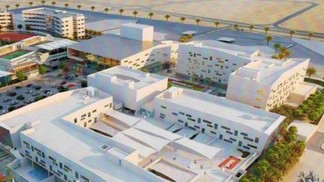Dec 3 2014
Design a sustainable campus able to host 2400 students with the highest standards of education (Florimont Institute of Geneva), and consuming half the energy used by standard buildings? And if the campus is built in a hot environment, such as the city of Dubai, where summer temperatures reach 49 °C?
 Source: DSA Architects International
Source: DSA Architects International
The challenge has been launched by Swiss International School of Dubai, who has commissioned an energy efficient campus that will open its doors in September 2015.
The school will be an outstanding example of a sustainable campus in a hot and arid climate. Its conceptual design results from a collaboration between ArchiLab, Minergie, EPFL Middle East and the EPFL Solar Energy and Building Physics Laboratory (LESO- PB).
As part of her PhD thesis at LESO-PB, supervised by Dr Jérôme Kaempf and Prof. Jean-Louis Scartezzini, Silvia Coccolo collaborated with Minergie and EPFL Middle East to define and implement a Minergie standard for hot and arid climates, work that started already in 2010.
For this Archilab project, Silvia Coccolo furthermore ran simulations with the software CitySim to define building and urban strategies to reduce the energy demand of the buildings and to increase the photovoltaic production of the site. The mutual shading of buildings, optimisation of the facades’ window ratio, and the choice of cooling materials were key parameters of the optimisation.
The next steps of this research will focus on the outdoor human comfort, optimising the choice of passive strategies to reduce the hours of discomfort in the outdoor built environment and improve the possibility of carrying out certain outdoor activities (recreation, terraces, pedestrian movements etc.) without the use of high energy consuming air conditioning systems.